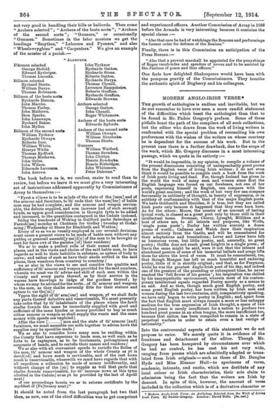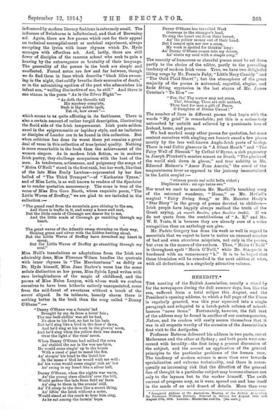MODERN ANGLO-IRISH VERSE.* THE growth of anthologies is endless and
inevitable, but we do not remember to have ever seen a more candid statement of the difficulties which beset the anthologist than that to be found in Mr. Padric Gregory's preface. Some of these pitfalls beset the path of the compilers of all such collections, but the editor who draws from the work of living writers is confronted with the special problem of reconciling his own preferences with the wishes of the writers on whose courtesy he is dependent for the success of his work. But in the present case there is a further drawback, due to the scope of the work, which Mr. Gregory discusses in a most interesting passage, which we quote in its entirety :—
"It would be impossible, in my opinion, to compile a volume of the present dimensions consisting of unimpeachably great poems from the English verse of living Irish writers : I do not even think it would be possible to compile such a book from the work of Irish poets living and dead. For, though Ireland has given to the world the work of many men and women since first the English language was forced on our forebears, not one of her poets, expressing himself in English, can compare with the world's great masters ; and the work of but very few can compare favourably in sublimity of thought, in beauty of expression, or in subtlety of craftsmanship with that of the major English poets. We have Goldsmith and Sheridan, it is true, but they are called Irish poets only because it happened that they were born here. As for the others : Moore, the creator of an amount of lasting lyrical work, is classed as a great poet only by those still in their intellectual teens. Drennan, Cherry, Lysaght, Milliken and a host of others are, to all intents and purposes, like Wolfe, `single poem poets '; Darley has written scarcely a dozen poems of worth ; Callanan and Walsh drew their inspiration almost entirely from the Gaelic, and will be remembered for their adaptations and translations ; Lover and Lever have left us humorous verse, but little poetry, and, assuredly, no great poetry; Griffin does not reach great heights in a single poem; of Davis the same might be said, were it not that the intense and abandoned passion of some of his immortal ballads and songs lifts them far above the level of verse. It must be remembered, too, that though Mangan has left us much beautiful and enduring poetry, little of it is strictly original; and that, as for Ferguson, while he was the greatest Anglo-Irish poet of his day, and indeed one of the greatest of the preceding or subsequent time, he never reached the `full flower of his genius '; his inspiration was chilled by his unsympathetic environment, wherein most of his contem- porary intellectual equals regarded Poetry merely as a means to an end. And so then, though much good English poetry, and some great English poetry, has been written by Irish men and women during the last two centuries, still, comparatively speaking, we have only begun to write poetry in English ; and, apart from the fact that English must always remain a more or less unhappy medium for the true expression of Irish thought, a space of two hundred years is surely insufficient for a nation to produce two hundred great poems in an alien tongue, the more insufficient too, because that nation has been compelled to remain in a state of perpetual warfare in order to retain even a last vestige of nationality."
Into the controversial aspects of this statement we do not propose to enter. We merely quote it in evidence of the frankness and detachment of the' editor. Though Mr. Gregory has been hampered by circumstances over which he had no control, he has cast his net very wide, ranging from poems which are admittedly adapted or trans- lated from Irish originals — such as those of Dr. Douglas
Hyde and Miss Eleanor Hull—to specimens of verse, academic, intimate, and exotic, which are destitute of any local colour or Irish characteristics, their sole claim to admission being the fact that the writers are Irish by descent. In spite of this, however, the amount of verse included in the collection which is of a derivative character or
• Modern Anglo-Irish Verse: an Anthology Selected from the Work of Livin5 Irish Posts. By Padric Gregory. London : David Nutt. Os. net.]
influenced by modern literary fashions is extremely small. The influence of Swinburne is infinitesimal, and that of Browning nil. Again, there are few poems which rest for their appeal on technical accomplishment or metrical experiment, always excepting the lyrics with inner rhymes which Dr. Hyde manages with effortless art. And, lastly, there are still fewer of disciples of the raucous school who seek to gain a hearing by the extravagance or brutality of their language. The generality of the poems in the book are simple and unaffected. Forced notes are few' and far between, though we do find them in lines which describe "black lilies swoon- ing in the night, that coldly breathe their souvenirs of death," or in the astonishing egotism of the poet who admonishes his infant son, "wailing diminutive of me, be still." And there is one stanza in the poem "As is the Silver Night"—
" As doth the throstle tell His mystery complete, Such is thy subtle spell, Yet oh, how sweet" - which which seems to us quite afflicting in its feebleness. There is also a certain amount of rather turgid description, illustrating the florid side of the Irish temperament. Irish poets seldom excel in the epigrammatic or lapidary style, and no imitators or disciples of Landor are to be found in this collection. But when criticism has done its worst there yet remains a great deal of verse in this collection of true lyrical quality. Nothing is more remarkable in the book than the achievement of the women singers. As in modern Irish fiction, so in modern Irish poetry, they challenge comparison with the best of the men. In tenderness, artlessness, and poignancy the songs of " Moira O'Neill " stand in the first rank, but her work, like that of the late Miss Emily Lawless—represented by her fine ballad of " The Third Trumpet"—of "Katharine Tynan," and of Miss Letts, is so well known to readers of the Spectator as to render quotation unnecessary. The same is true of the verse of Miss Eva Gore Booth, whose exquisite poem, "The Little Waves of Breffny," we are glad to see included in the collection :- "The grand road from the mountain goes shining to the sea, And there is traffic in it, and many a horse and cart, But the little roads of Cloonagh are dearer far to me,
And the little roads of Cloonagh go rambling through my heart.
• • •
The great waves of the Atlantic sweep storming on their way, Shining green and silver with the hidden herring shoal, But the Little Waves of Breffny have drenched my heart in spray.
But the Little Waves of Breffny go stumbling through my soul."
Miss Hull's translations or adaptations from the Irish are admirably done, Miss Florence Wilson handles the quatrain with inner rhymes in " The Merchantman" as deftly as Dr. Hyde himself, Miss Jane Barlow's verse has the same sedate distinction as her prose, Miss Sylvia Lynd writes with rare lovingkindness of the magic of childhood, and the poems of Miss Helen Lanyon, with whose work we confess ourselves to have been hitherto entirely unacquainted, come from the mid-fount of sweetness without a touch of the smart dirtied. In its intimate, homely charm there is nothing better in the book than the song called " Danny O'Shane".
"Danny O'Shane was a farmin' lad
Brought by my da from a hirin' fair ; The one luck-shillin' was all he had, No shoe to his foot, no hat to his hair.
But he'd sing like a bird in the face o' dawn, And he'd sing at his work in the glowin' noon, And he'd sing when the yellow dusk was drawn Over the light o' the risin moon.
When Danny O'Shane bad milked the cows An' stabled the ass in the wee ass-byre, He would come singin' up to the house
With a creel o' peat to mend the fire.
An' stoopin' his head to the lintel low In the name o' God he would wish me well : An' his voice would come ringin' rich an' low
An' swing in my heart like a silver bell, Danny O'Shane, when the nights was warm,
An' the young stars climbhi' over the bill, Would gather the lads from field an' farm An' sing to them in the evenin' still. An' I'd creep to the door like a secret thing, An' liftin' the latch without a noise,
Would stand at the crack to hear him sing, As he sat among the farmin' boys.
Danny O'Shane has travelled West Overseas to the stranger's land, To sing the heart out from their breast,
An' the yellow money out of their hand. But I cannot spin nor sew a seam, My work is spoiled for thinkin' long : An' Danny O'Shane comes into my dream,
An' steals my soul with a simple song."
The scarcity of humorous or cheerful poems must be set down partly to the choice of the editor, partly to the prevailing
tendency of modern Irish verse. True, we have two delightful lilting songs by Mr. Francis Fahy, "Little Mary Cassidy " and "The Ould Plaid Shawl"; but the atmosphere of the great majority of the poems is autumnal, regretful, elegiac, and finds fitting expression in the last stanza of Mr. James Cousins's " To Eire"
"For, tho' Thy sorrow may not cease,
The', blessing, Thou art still unblest, Thou bast for men a gift of Peace, 0 Daughter of Divine Unrest I" The number of lines in different poems that begin with the words "My grief" is remarkable; yet this is a melancholy untouched by unfaith and relieved by a passionate love of Ireland, home, and peace.
We had marked many other poems for quotation, but must content ourselves with singling out honaris causd a few pieces mostly by the less well-known Anglo-Irish poets of to-day.
There is real Celtic glamour in "A Silent Mouth" and "The Fairy Well of Slemish" by Cathal O'Byrne, a rich pageantry
in Joseph Plunkett's sombre sonnet on Death, "The glories of the world sink down in gloom," and true nobility in Mr.
Edmond Holmes's "Amor Fons Amoris," the creed of the magnanimous lover as opposed to the jealousy immortalized in the Latin couplet :— " utinam possis uni mihi belle videri j Displiceas aliis : sic ego tutus ero."
Nor must we omit to mention Mr. MacGill's touching song of the returned wanderer, " Home," or Mr. McCall's magical " Fairy Swing Song," or Mr. Maurice Healy's "Star Story" in the group of poems devoted to children— Irish people have happily always realized the troth of the Greek saying, tdi veissaii Satan, xiipts /3asoiersv Oraiis7. If we do not quote from the contributions of "A. E." and Mr. W. B. Yeats, it is because they are already sure of a wider recognition than an anthology can give.
Mr. Padric Gregory has done his work so well in regard to essentials that we regret to have to notice an unusual number of bad and even atrocious misprints, not only in the poems, but even in the names of the authors. Thus, " Moira O'Neill" is throughout spelt " Monis O'Neill," while Mr. Stacpoole is burdened with an unnecessary " k." It is to he hoped that these blemishes will be remedied in the next edition of what,
with all deductions, is a singularly attractive -volume.



































 Previous page
Previous page